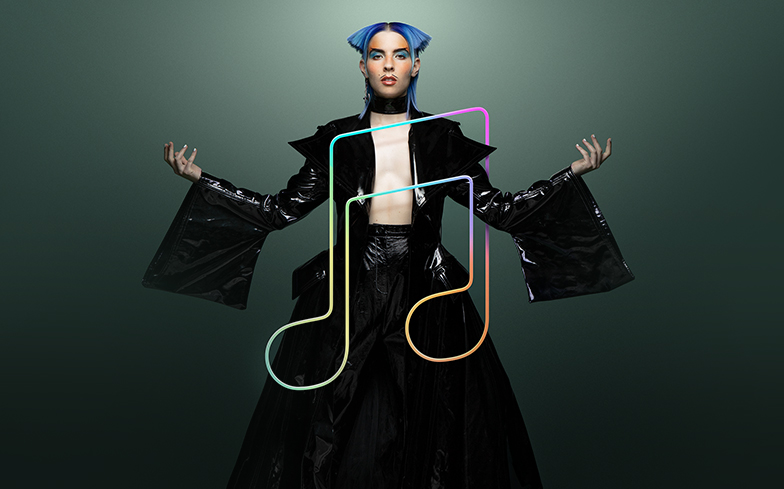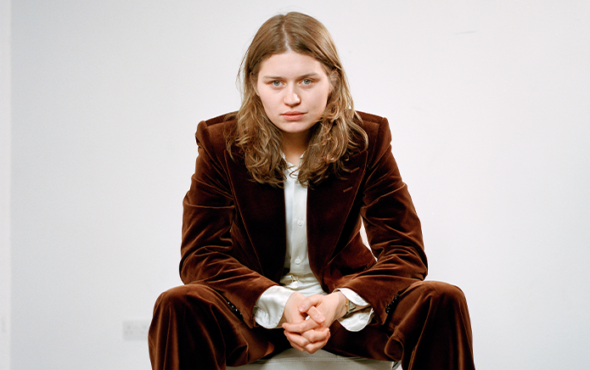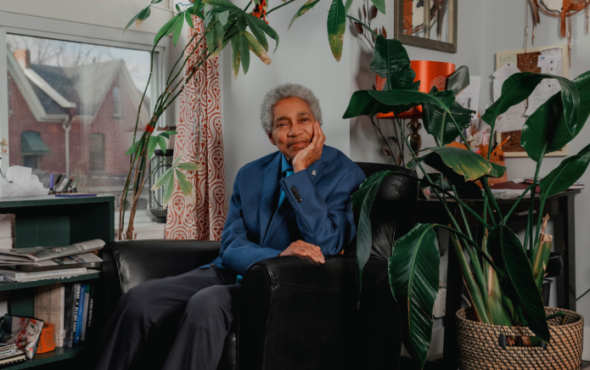
Remember when pop music used to be fun?
There was a time when balls-to-the-wall bangers and boundary-pushing statements reigned supreme, when big-budget music videos were defining moments in pop culture and tuning into the Video Music Awards each year meant you were guaranteed iconic performances and red carpet looks you’d be talking about for years to come. Queer people, especially, have historically been drawn in by more escapist forms of pop, which is why you’ll often find gay men longing for the days of Bad Romance, Rude Boy and California Gurls – and still dressing up as their favourite noughties singers for Halloween. Fortunately, there’s an artist on a mission to make unashamed pop music great again: Dorian Electra.
The gender-fluid American singer-songwriter recently dropped their long-awaited debut album Flamboyant, and as the title suggests, it’s a celebration of all things camp, colourful and extravagant. From opening track Mr To You, on which Dorian invites listeners to peer into their avant-garde world, through to album closer Freaky 4 Life, an outsider’s mission statement that grinds with pulsating synths and guitar riffs, the exquisitely-crafted 11-track record is full of witty wordplay and catchy hooks that solidify Dorian’s place as an icon in the queer music scene.
“I’ve always been drawn to music and art that’s fun and isn’t taking itself too seriously. Especially when it comes to being cool, there can be a really serious side where people think, ‘Well, it must be more authentic because the person is just super serious with raw emotions’, but that’s a performance too,” they state. “My taste is a little different. I think there are some people who are really doing it well, especially in hip-hop. I would say Young Thug is a really cool example of somebody changing the game, and also Tierra Whack too, they’re artists who are coming in and doing these crazy voices and things that are seemingly outrageous and ridiculous but people are like, ‘Wow, they have the confidence to do that, that’s really cool’. The essence of true coolness is being yourself and not giving a fuck, and I think people do sense that. And then, of course, people try to copy that and that becomes the norm, and then someone challenges that and so on, it’s like a cycle.”
Pop is often regarded as the McDonald’s of music – a cheap and quick fix offering no nutritional value – but Dorian is proof that creating great pop doesn’t have to come at the expense of substance or long-term value. Through humour and parody, both of which have long been used by oppressed groups to fire back at those with power, they’re able to tackle some of today’s most pressing social justice issues. Man To Man attempts to convince those with toxic masculinity syndrome that embracing their soft side and opening up about their feelings is the true way to be manly; Adam & Steve challenges the trite argument that religion and homosexuality can’t exist hand-in-hand; and Career Boy makes a mockery of the shackles of capitalism and the workaholic mindset. It’s purposeful pop (are we still saying that?) at its finest.
“I think those are some of the most powerful tools we have as artists to communicate things politically, socially and culturally,” Dorian explains. “You make an idea really inaccessible when you’re presenting it in a way that’s taking itself too seriously. By showing that you’re making fun of yourself as well as others, it makes an idea so much more accessible, and it also shows that you’re down to earth and not trying to be self-righteous and holier-than-thou.”

You might think that blurring the lines between hyper-aware social commentary and outrageously catchy tunes would be a hard practice to master, but for Dorian, it’s the only way they’ve ever known. “I feel too insecure to write if it’s just a fun idea or a cool melody,” they admit, “and I think everything is kind of political whether or not it’s even trying to be. Even if I didn’t want to, I wouldn’t be able to help but think about those things, I studied philosophy and history and science in school, and my brain just works in a really analytical way. Sometimes I wish I could turn it off and go into a more poetic or romantic view of the world, but that’s just not the way my mind has been formed.
“When I was thinking about how I wanted this album to sound, I was like, ‘What kind of music am I even trying to make? Am I trying to make some minimal pop beats with a synth and then a snap?’ – you know how that was a really big thing in 2016 pop music? I was like, ‘Do I need to make that kind of music in order to sound like a pop star?’ So I thought about doing that to be accepted. But then I realised, ‘No, that’s not going to be interesting, obviously the best thing to do is whatever I think is the most fun and interesting thing that catches my own attention’. But I think that’s one thing that a lot of artists struggle with in order to be perceived as a pop artist or to be part of the art form, how much do you need to be sounding and looking like the other artists already doing that, and how much do you need to stand out from that? Because there does have to be some overlap, and it does have to be relevant and speak to that art form.”
While Dorian’s music does indeed feature some key staples of pop – high quality production and radio-friendly choruses are the most obvious – there are so many artistic choices that feel purposely designed to challenge the listener’s perception of what good pop music can be. Some might deem it unlistenable, others think it’s a work of art (we’re firm believers in the latter). So naturally, we had to ask how all this comes about – and trust us, hearing Dorian describe their creative process is almost as enjoyable as listening to the music itself. “When we were making Musical Genius, [producer] Dylan Brady and I were like, ‘What’s the least expected instrument that could come next?’ and Dylan’s like, ‘I have this jazz thing that goes like [imitates sound]’, so we threw that in there, and then I’m like, ‘Okay, how about dubstep after that?’ We were purposefully going for the craziest sounds,” they laugh.

“We did it for Mr To You as well, [producer] Robokid and I were like, ‘We’re bored of this, it sounds too generic, we need a freaking saxophone, we don’t have one on the album!’ And then we ended up getting someone to actually record on a real saxophone, which was one of only two real instruments on the album. The rest is all made on a computer. Same with my vocals too. I’m a very ADD person so I’m like, ‘Alright, I’ve done this voice, I’ve done this character, what’s something I haven’t done yet?’ Like, ‘I’ve done this Gregorian monk chant, I’ve done this gravelly low voice, now let me do this high screechy voice’. I feel like that’s how a lot of it comes together, I just try to do the opposite of what’s come before, or I’ll take something that people think is really uncool. Honestly, that was a guiding principle for a lot of stuff on the album, I was like, ‘What is really uncool right now, let’s slap that in there’, like a lame guitar solo that ends up sounding lit because you go fully into it. That’s my advice when people are like, ‘How do I make cool music’, just literally think of the things that are the most uncool and go into them so wholeheartedly and genuinely and maybe it will sound cool in the end.”
Despite eschewing current sounds and what’s deemed to be ‘cool’ in the mainstream, there’s clearly a desire for what Dorian is selling. Their shows sell out, and standout track Man To Man has just hit one million streams. Stan culture is alive and well. “It’s been so affirming and amazing to see people’s reactions to [the album], and to see that people get it, they get the vision and the aesthetic,” Dorian beams. Flamboyant, which they describe as “medieval, heavy metal high-pop”, has become a lifeline for young people in places less accepting of queer identities, especially those relating to gender nonconformity. A show in Nashville, part of America’s traditionally conservative south, holds particular poignancy for Dorian. “There were so many queer kids who came to the show like, ‘We don’t have shows like this in Nashville, we never have all this queer energy’, and when we left some of the openers were talking about putting together another show and wanting to throw a party, and it’s so cool to see that energy reverberating through those communities.”
Dorian’s status as a role model, especially in an industry that’s lacking in representation for those with diverse gender identities, is one they take very seriously – and they encourage others to use their voice for good as well. “I remember how important and influential certain bands were for me as a teenager, and how they inspired me to do things and change the whole course of my life,” they recall, “so I feel like whether or not somebody wants to be a role model, they do have a responsibility to recognise that if they have fans then they are a role model to some people, and they should take that responsibility accordingly. It doesn’t mean you have to change anything about yourself, it’s just being aware of how you impact others.”

Fortunately, Dorian isn’t alone in their quest for domination. They belong to an incredibly diverse, celebratory group of queer artists who regularly collaborate, support each other on their wide-reaching social media platforms, and provide positive and successful role models for young LGBTQ people that haven’t always existed. As a squad of (mostly) independent artists without big-budget label support, Dorian believes it’s essential. “More than any industry support or anything, it’s always been support from other artists like Rina Sawayama, Chester Lockhart and Charli XCX, and I think all of us supporting one another shows people in the industry that we’re all doing our own thing but we’re not competing with each other,” they explain. “I don’t like to call it queer pop because it’s not like people’s identities necessarily dictate what the music sounds like, but there’s definitely a reason why a lot of us share so many of the same fans, who often are queer. I think it’s so important for us to all support one another, especially at a time when there are industry people questioning whether we’re viable or how wide our reach is gonna be if we’re queer. Obviously people are challenging that now, and I think artists supporting artists is the biggest way we can demonstrate that to everyone.”
As for whether queerness will ever truly dominate the mainstream, Dorian points to artists like Lil Nas X, the gay black rapper who made history when country-rap hybrid Old Town Road became the longest-running number-one single in American history; Sam Smith, who recently came out as non-binary; and Lizzo, the body-positive chart-topper, as examples of the general public’s willingness to accept – and even desire – what’s previously been seen as ‘unsellable’ by the entertainment industry. “This year alone has been incredible and I feel so energised,” they say of the current state of popular music. “Finally, we have some interesting people, let alone people who have an amazing message to share that is so uplifting. I love positive music. I know it might not be cool, but I love a positive message. And I love positive role models – we stan them!”
Dorian Electra is the second artist to be featured as part of a new collaboration between GAY TIMES and Apple Music called Elevate; a campaign to support and platform LGBTQ music talent as they break through into the mainstream.
Dorian Electra’s debut album, Flamboyant, is available to stream on Apple Music now.
Photography Jakub Koziel
Words Daniel Megarry
Fashion Umar Sarwar
Hair Sven Bayerbach at Carol Hayes Management
Make-up Ana Takahashi
Fashion Assistant Miranda Mikkola



